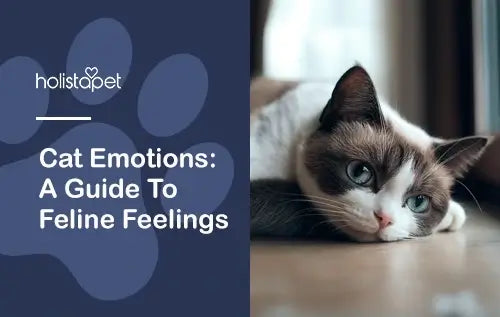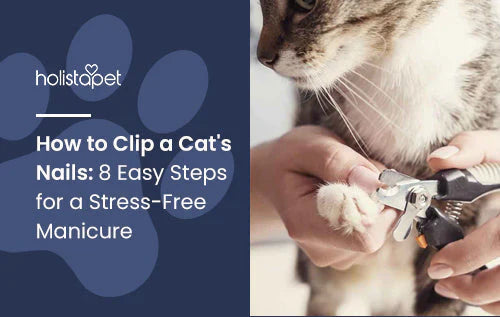Cat owners know this all too well: Their pets sleep for hours, then zoom around the house at 3 AM. The culprit: melatonin for cats. Just like humans, cats have this natural sleep aid that tells their bodies when to sleep and when to play.
In this article, you'll learn all about melatonin and what it can do for your feline friend. Aside from melatonin's benefits, you'll also understand its proper dosing and safety guidelines. Ready to help improve your cat's sleep and support their overall health? Let's begin.
Common Uses of Melatonin in Cats
Melatonin is a naturally occurring hormone produced by the pineal gland. It helps regulate sleep cycles in both humans and animals. In cats, melatonin tells the body when it's time to sleep, making it a great sleep aid.
Pet owners like to use melatonin to help with their cats' sleep disorders, stress, and anxiety. While it plays a vital role in promoting restful sleep, melatonin does many other wonderful things for our feline friends, too. We'll tell you more about them in the succeeding sections.

Cat Melatonin Uses [Effects and Benefits]
It might surprise you to learn that melatonin does more than help your cat sleep. This hormone actually offers other types of support for your furry friend. Let's go over the following benefits and effects melatonin has on cats:
- Melatonin for Calming Stress and Anxiety
- Melatonin for Managing Fear and Phobias
- Melatonin for Addressing Sleep Problems in Cats
- Additional Uses of Melatonin in Cats
Melatonin for Calming Stress and Anxiety
Do nervous behaviors burden your cat? Melatonin may bring them the calm they need. This natural remedy may help ease their agitation during stressful situations. Think moving houses, going to the vet, or hearing loud noises.
Giving your kitty melatonin before tense moments can help them stay relaxed. Thanks to melatonin, their enhanced mood can lead to a more positive experience than a traumatizing one.
Melatonin for Managing Fears and Phobias
If your pet is a certified scaredy cat, melatonin can help. It works by calming the nervous system so your pet can feel more secure during scary situations.
Whether it's frightening thunderstorms, loud fireworks, or new environments, melatonin can bring relief. By reducing their worries and promoting calm, the natural remedy can help your feline friend cope with their fears like a champ.
Melatonin for Addressing Sleep Problems in Cats
Perhaps the most famous benefit of melatonin is providing sleep support. You've probably used one to get more sleep at some point. For pets, especially older cats, the hormone helps regulate the sleep-wake cycle. This support helps kitties fall asleep and stay asleep through the night.
If your cat's sleep patterns are out of whack, or maybe they have insomnia, they may benefit a lot from melatonin for cats. With restful sleep, your furry friend can wake up feeling refreshed and ready for the day.
Related Post: How Many Hours A Day Does A Cat Sleep?
Additional Uses of Melatonin in Cats
You may not know it, but melatonin may benefit cats with skin and coat issues too. This hormone may also help manage skin irritation or rashes, reducing redness and swelling. Plus, melatonin might help with seasonal hair loss, promoting a healthier coat.
Lastly, when melatonin improves a cat's mood and behavior, it can have a positive effect on their overall wellness. When your cat feels safe and relaxed, they can better face stressors and potentially health issues.

Is Melatonin Safe for Cats?
Absolutely! As long as you give it in the right amounts, melatonin for cats is totally safe. It's generally well-tolerated by our feline friends. But it's always best to consult your veterinarian before starting supplementation. Get their approval first to make sure your cat's body really does need more of this helpful hormone.
Optimal Timing for Administering Melatonin to Cats
For better sleep, the best time to give your cat melatonin is at night, a few hours before bedtime. This timeframe allows the supplement to work its magic on your cat's natural sleep-wake cycle.
To manage anxious behaviors, give your pet melatonin about 30 minutes to an hour before a known stressful event. This allowance makes sure the calming effects take place at the right moment.
How Long for Cat Melatonin To Take Effect?
Melatonin usually only takes 15 to 30 minutes to take effect — pretty quick, right? This rapid onset makes it a super convenient natural remedy for unexpected stressful incidents. It's also an ideal addition to your cat's nightly routine to prepare them for some good sleep. Be sure to monitor your cat's response to the melatonin supplement to determine the perfect timing.
Duration of Melatonin in a Cat’s System
The effects of melatonin in a cat's body can last for about 8 to 12 hours. This duration makes melatonin perfect for easing overnight sleep problems. It's also helpful in sustaining a cat's good mood and calm demeanor during prolonged stressful events.
Suggested Melatonin Dosage for Cats
The proper dosage depends on several factors, such as a cat's age, weight, and specific needs. Generally, adult cats need about 1 to 3 mg. We suggest you start with the lowest effective dose and see how your cat reacts.
Consult your veterinarian to figure out how much melatonin to give your cat. Your vet can recommend the appropriate amount for your furry friend. Remember, not all cats are the same, so get your vet's advice for the best results.
Are There Any Potential Side Effects of Melatonin in Cats?
As mentioned, melatonin is generally well-tolerated by most cats. But some kitties may still experience negative side effects:
- Drowsiness
- Tummy Troubles
- Signs of Irritation or Agitation (in very rare cases)
If you notice these symptoms after giving your cat melatonin, consult your vet on what to do next. They may adjust your pet's dose to ease the side effects and supplement your cat safely.
When To Avoid Using Melatonin for Cats
Not all cats need melatonin. For example, pets with certain health conditions or taking specific medications should avoid it. Liver or kidney issues, in particular, can make it difficult for cats to process melatonin. This challenge could lead to complications.
Pregnant or nursing cats should also avoid melatonin unless prescribed by veterinary medicine experts. Always consult your veterinarian to ensure the product is safe for your cat's unique health profile.
Risk of Melatonin Overdose in Cats
The potential risks of melatonin overdose in cats are pretty low, but it can still happen. An overdosed cat may exhibit signs like extreme drowsiness, tummy upset, and unusual behavior. If you suspect an overdose, contact your vet immediately. They'll guide you through what you need to do.

Types of Melatonin Products for Cats
Various specially formulated melatonin products for cats are out on the market. Depending on your furry friend's needs, you can choose from the following:
- Tablets. If your cat doesn't mind taking tablets, this can be a good option to give them precise doses of melatonin.
- Liquid Drops. You can mix drops with your cat's food for easy consumption, especially if your cat doesn't like tablets.
- Melatonin Treats. You can't go wrong with melatonin-infused treats. They're tasty and super easy to administer.
- Melatonin Chews. Chews are like treats, too. They're ideal if you have an adult cat or a senior pet that has difficulty chewing hard treats.
Pro tip: If you want other options, HolistaPet offers a range of calming cat products. Thousands of satisfied pet parents have tried and tested our offerings. Read their reviews on our website, and check out our shop for different options.
Selecting the Right Melatonin Supplements for Your Cat
When choosing a melatonin supplement for your cat, you need to keep a few things in mind. Here are some tips to guide you:
- Formulation. Choose products specially formulated for cats to ensure safety and effectiveness. Human melatonin supplements may contain ingredients or dosages that are not good for kitties.
- Ingredients. Look for natural ingredients. Avoid artificial flavors, colors, and preservatives, as these can negatively impact your cat's health.
- Veterinarian Advice. Consult your veterinarian for tailored recommendations based on your pet's health needs.
- Product Reviews. Look for products with positive reviews from other cat owners.
Fun fact: All HolistaPet cat products prioritize feline health and safety. Our supplements contain only natural ingredients. They're also gluten-free, dairy-free, and non-GMO. Plus, they're all third-party lab-tested and vet-recommended to guarantee high quality.
Final Thoughts - Melatonin for Cats
Better sleep and a calmer heart — what could be better for your dear feline friend? With proper dosage and your vet's expert guidance, melatonin can be a great addition to your cat's wellness routine. Take advantage of this effective natural remedy, and let your furry buddy sail through life with ease.







![Probiotics For Dogs [Soft Chews] - HolistaPet](http://www.holistapet.com/cdn/shop/files/Probiotic-Infographic-1_472d7a29-e30c-435a-9638-1365d8c3a9f9.jpg?v=1725384841&width=104)



























Leave a comment
All comments are moderated before being published.
This site is protected by hCaptcha and the hCaptcha Privacy Policy and Terms of Service apply.